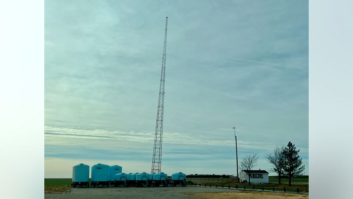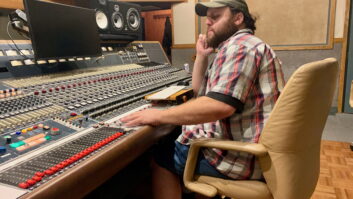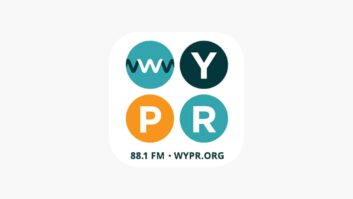(click thumbnail)I have bad news and good news and bad news and good news.
The bad news is that ATR 1170 – the little Part 15 AM radio station in my basement – is off the air for a good part of the winter until I can iron out all the technical bugs I explained a couple of installments ago. The frequency may be in question and my phone lines are soaking up the signal like a thirsty clam.
The good news is that I now have a new voice to flesh out my one-man on-air lineup.
The bad news is he is synthetic.
But the good news is I don’t have to pay him.
Before the rest of this piece becomes a bad-news, good-news vaudeville act, let me just start at the beginning.
Too generic
Right around the time I got the earlier incarnation of my license-free AMer up and running, I became concerned that my voice was the only one heard between songs. Just as stations everywhere have out-of-market voices acting as “liner guys,” I knew ATR needed the same.
Yet I also knew I could not approach some of the more notable voice talents in the industry and beg for freebie cuts that could only be heard for four blocks. I’d be laughed off the air.
Many of the new breed of liner guys making their presence known on the broadcast newsgroups are likewise out of the question: several are not that good and some use bleeps and zaps that are about 10 years out of date.
Besides, ATR is not “just another station” and I believe deserves something a little off the beaten path. The typical lasers and hip-hop beds used everywhere would seem awkwardly out of place here. And the expense of a polished liner-guy voice could not be justified.
Happily, thanks to the Internet, I came across a solution that is just goinky enough to work for me and still sound somewhat refined for air on AM radio – speech synthesis, or “text-to-speech” technology.
That noble voice
Yep, I am talking about the same, hard-to-listen-to, mechanized drone heard now on NOAA weather radio, wristwatches, Web pages that speak, ham radio repeaters, electronic educational toys and talking microwave ovens.
But before you groan, hear me out. Text-to-speech (TTS) technology has earned its prestigious position as the official ATR Liner Guy because of its proud heritage.
If the TTS circuit in the Texas Instruments Speak-And-Spell didn’t exist, countless children may not have learned to read during the early 1980s. We would never know the true genius in the words of Professor Stephen Hawking without hearing them for ourselves through his speech generator.
We would not today have Kurzweil musical keyboards and its related technologies, as the company earned its early reputation with scanning devices that could read books and correspondence out loud.
And no matter how you feel about NOAA’s automated “Perfect Paul” digitized weathercaster, if it has saved one life during stormy conditions, it has done its job.
With such an impressive résumé going for it, it is only natural that the next great step toward eternal glory for TTS technology should be to become the official voice for “ATR 1170, the crappy little station with the crappy little sound.”
Ladies and gentlemen, you already know Perfect Paul. Meet his illegitimate cousin, Honkin’ Harry.
When Harry Met Al
Actually, Harry is an amalgam of several speech-generation programs that are free for the taking and using.
There are many that I have tried and only a few that I use, and among my favorites are ReadPlease 2000, a freeware TTS program that is available from many shareware sites or downloadable from its parent company, ReadPlease.Com. The speech is fairly good and there are four character voices to choose from and modify to your liking.
Unfortunately, ReadPlease 2000 can only talk; it is quite impossible to record the voice or save it as a WAV file, which is what ATR 1170 needs to drop between songs or to talk up breaks. It becomes necessary to record it off to other media (DAT, MD), then record it back into the PC via an audio editing program.
Some soundcards come with a utility that allows the recording of whatever audio is being played by the card, essentially capturing its own performance to disk in real time. Mine doesn’t. That’s what I get for going the cheapie route.
My second software choice is not software at all, but the interactive Web site at Bell Laboratories. Here, you can try out the latest TTS technology offered by Bell and Lucent Technologies by typing in a desired phrase and hitting “Submit.” The Bell server then “reads” the text and immediately downloads a WAV or AU file to your computer.
I love this site because it will let you go in up to 40 times per day and pull down phrases of up to 30 words each, delivered as WAV files and ready for air. Not many stations these days let their jocks say much more than that anyway. Plus, the speech is very clear, well-modulated and sounds less robotic than many other previous programs.
Batty about Atty
There is a problem with character spacing and the interpretation of “ATR,” however. Even with spaces or periods between the letters, the “A” is pronounced as it is in “cat” rather than “Kate.”
So according to Bell Labs, Harry says, “You are listening to Atty-Are, One-One-Seven-Zero.” If you try this site yourself, be particular in the way you write your desired text.
To get Harry to speak on the air, it is necessary to first come up with what is desired he say. That could be a bumper, a liner, the official on-hour ID, or even a joke.
Hearing the bland, emotionless way Harry cracks a joke is by itself quite funny. You’re not sure whether you missed the punchline, or you are being left out of an “in” joke. Either way, the humor does not come from the joke, but in the reaction felt from the delivery or lack thereof.
Once the break is decided, text is entered and the speech output is recorded as a WAV that gets inserted into the automation playlist. At the proper time, the WAV file is played back in sequence.
There might be a way to enter text only, then automatically launch a TTS plug-in that lets Harry perform “live” instead of writing and recording it first. It would be a huge timesaver, and such technology already exists for creating “talking” Web pages. But it’s not a big priority for me.
On top of everything else, I cannot always trust Honkin’ Harry with pronunciation or proper inflection. Depending on the program I use, simple phrases can get badly mangled.
Take a simple PSA:
“Do you like pancakes? Nothing’s better in the tummy on cold winter mornings, and the Annandale Volunteer Fire Department has a tasty pancake breakfast coming up on the 23rd at the headquarters on Maple Avenue.”
Besides the inflection? ending up in? the wrong places?, such a PSA occasionally can turn out like:
“Nothing’s better in the t’m-eye on cold winter mornings and the An-NAN-daleVol-lun-TEE-YUR Fire Department has a tass-tie pancake brake fast coming up on the two-three-rud at the head-QUAR-ters on May-PUHL Avenue.”
Harry gets promoted
Once ATR officially relaunches following some technical corrections (I really want to keep this thing legal), Honkin’ Harry will have been given additional responsibilities and may even sport a new voice, assuming improvements made in the TTS field.
If you wish to mess around with some TTS speech on the air, be aware that many sites do not allow for commercial use of the output of its TTS products unless you purchase them. You will find out which ones are out there and which ones charge if you do a Google search (www.google.com) using the criteria “text-to-speech.”
To try the Bell Labs TTS generator, visit www.bell-labs.com/project/tts.voices.html
ReadPlease 2000 is available as a free download at readplease.com
Now if you will excuse me, I have a tass-tie brake fast to attend to.
Hear a sample of Honkin’ Harry’s performance along with his siblings in Windows Streaming Media.








